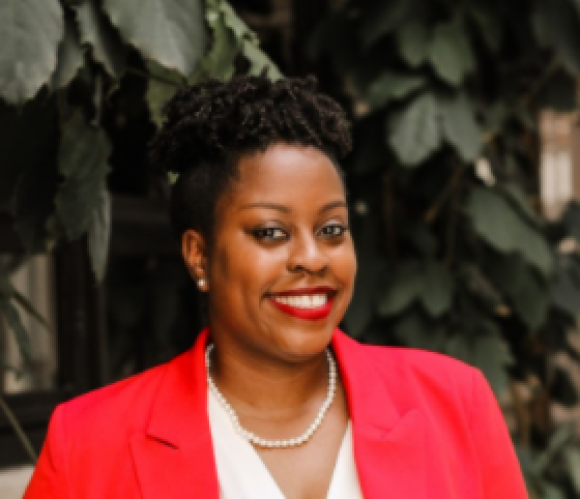For 12 years as a health teacher, Diane Courington had a core goal for all her classes: to create a safe space for everyone. This drive was born out of her personal experiences, remembering times she was withdrawn and couldn’t concentrate as a student herself because she was thinking about experiences outside of school—difficult things like losing her father at a young age.
“My job is to teach and to provide a space for students because that may be the only 55 minutes they have in a safe space,” Courington says. “That sense of belonging is something we all look for; we want to be accepted and loved and comforted with empathy and compassion.”
Now working as an Amgen Biotech Experience (ABE) ambassador for the ABE Kentucky team at Bellarmine University, Courington is working to reach as many students as possible, to help them feel welcomed into science. The role of ABE ambassador is new, focusing on leveraging community assets, local and regional Black-led organizations and initiatives, and STEM partnerships to support and scale ABE within the local community and region. The first ever ABE ambassador, Courington is defining new ways to bring the program to underserved communities in Kentucky, the newest ABE site, including by meeting students where they are in the community rather than solely relying on the schools.
This past spring, Courington completed her doctoral degree at Bellarmine, studying how racial trauma affects K–12 (primary through secondary) students of color, as well as how historically Black colleges and universities provide a safe and nurturing environment thereafter. Her passion is student advocacy, figuring how to get students the resources they need to succeed.
Courington decided to study the effects of trauma in the classroom after an experience with a kindergartener when she was still teaching. She remembers this one 6-year-old boy among dozens in her class. He was clearly distraught but did not want to talk. After working with him for a while, giving him space and time, Courington learned about some struggles at home, with his 78-year-old grandfather as his main caregiver. That experience led her down the path of wanting to learn more about trauma and how to help children excel in the classroom.
“I was just noticing the students in my room looking and yearning for representation, looking for a safe space where they could just relax and let it all out if they needed to, to be able to keep being successful in school,” she explained. “And so that's what made me want to look at racial trauma in K through 12 education.”
After completing her doctoral work, Courington was recommended to Bellarmine’s biology department to work on diversity, equity, and inclusion, specifically building partnerships with students and community organizations. It was then that she met the ABE Kentucky team and hit the ground running.
The ABE kits have now gone out to four schools in two school districts in the Louisville area after a regional professional development institute was held to train teachers this past summer. Courington was excited to join the training, using a pipette for the first time. “I was nervous, as the biology world is new for me,” she says, “but I learned that it’s OK to try and mess up and still have fun and learn something new.”
While the schools start with the ABE kits, Courington is doing outreach to the local Boys & Girls Club in the Louisville area, to introduce them to ABE. In this area with predominantly Black students, the goal is to reach middle and high schoolers who need a safe place to go after school. Courington also hopes to offer some lab days on Saturdays. “I know what it’s like for students who want to be successful and need some hope or inspiration,” she says.
Courington is also looking at other potential community partnerships, including recruiting students from Bellarmine’s Women in STEM program and education majors to train students and work with teachers. “We are learning as we go, hoping to expand opportunities for hands-on STEM throughout the region,” she says. “I am happy to bring my experience as someone outside of STEM, who sees things through a different lens.”
